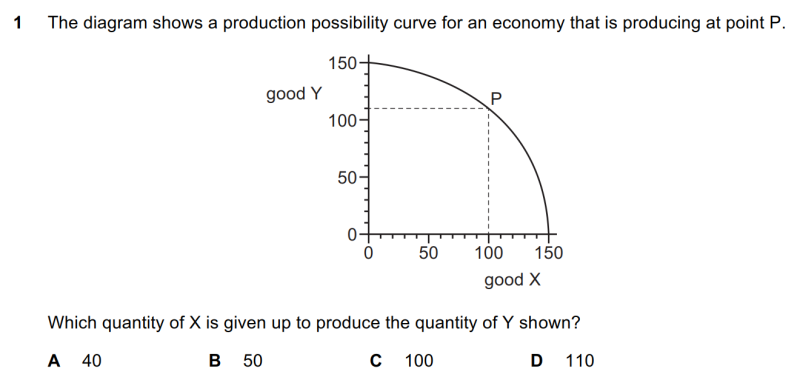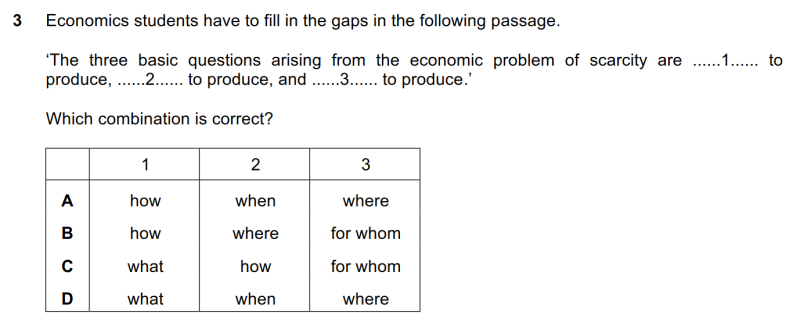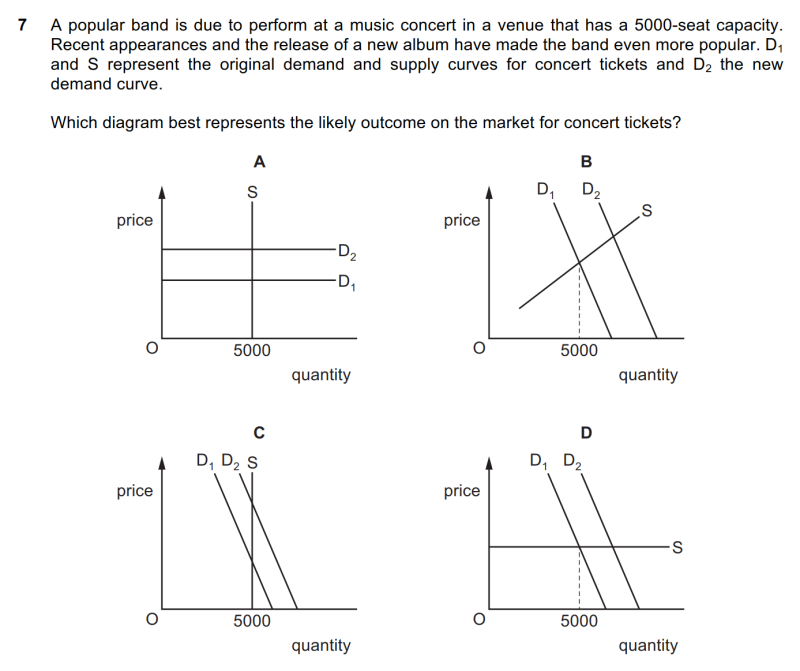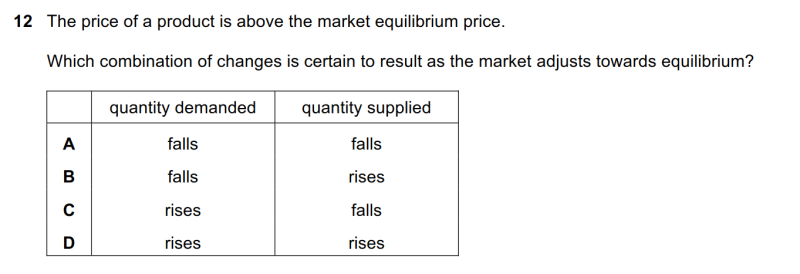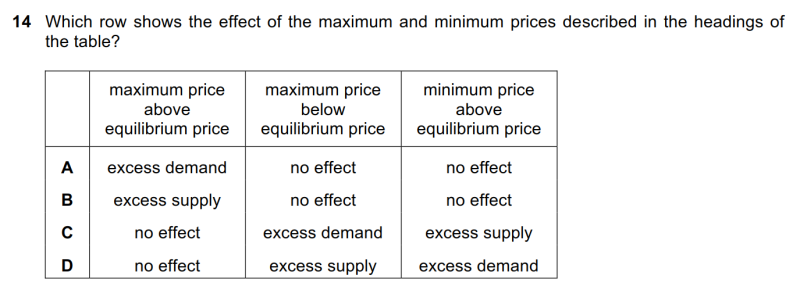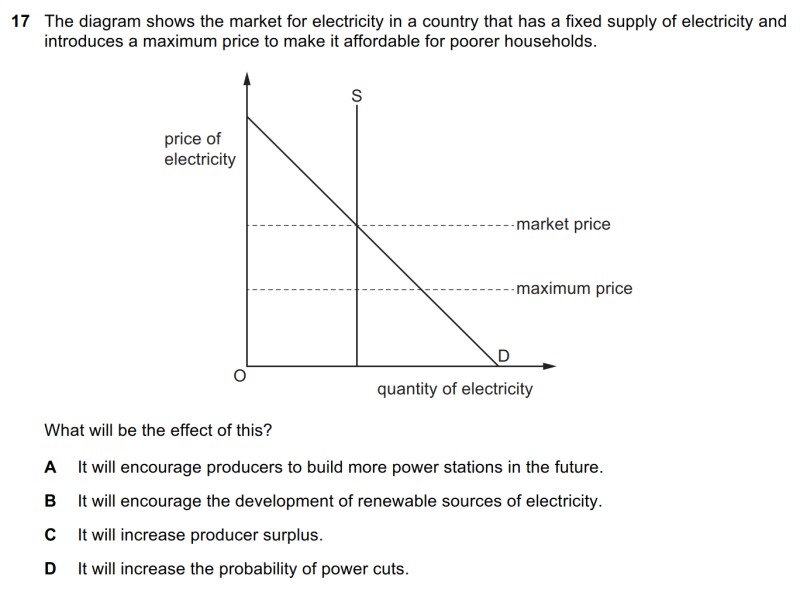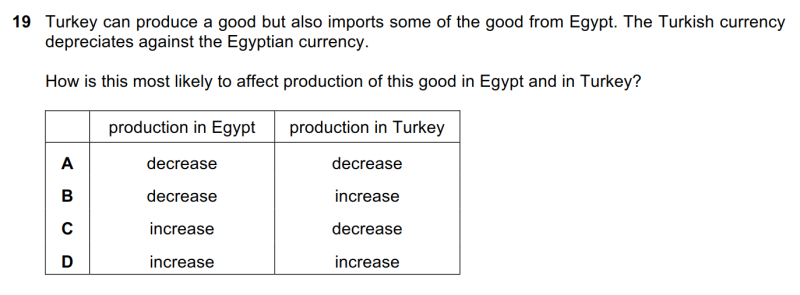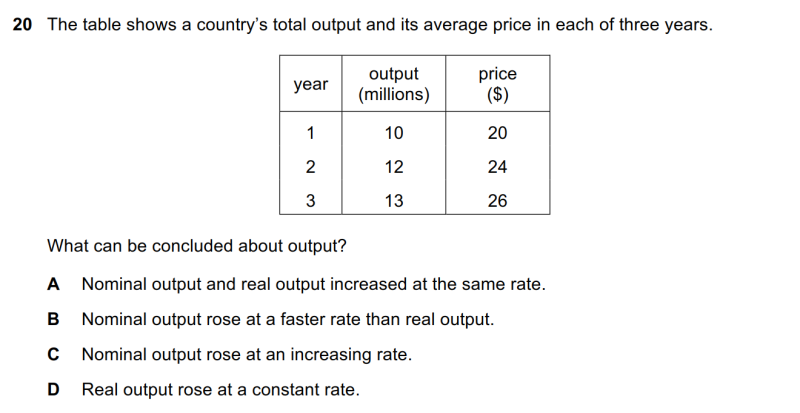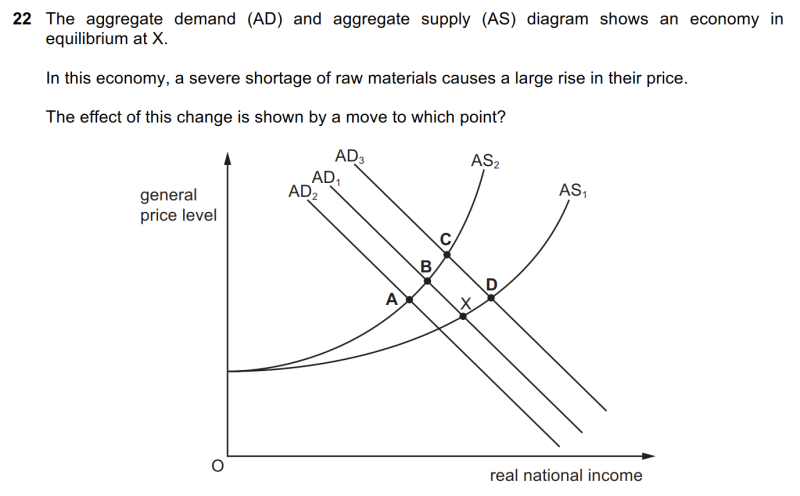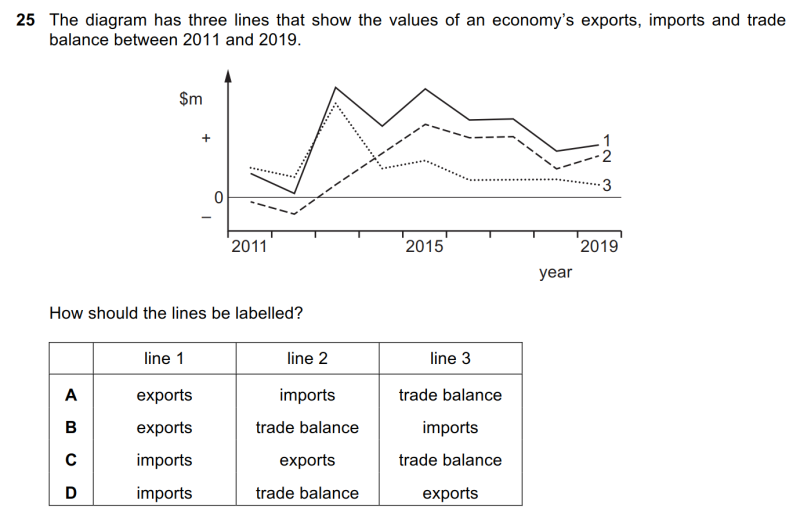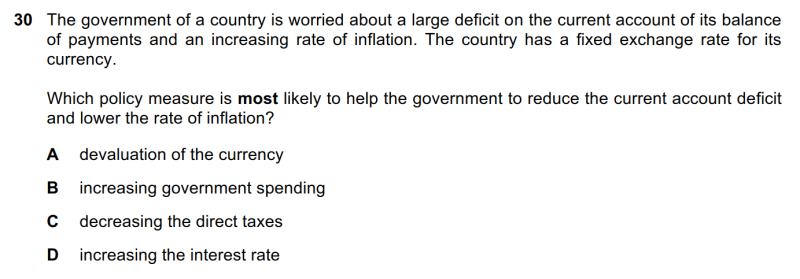“9708 s22 qp 11”的版本间的差异
跳到导航
跳到搜索
【点此返回历年真题目录】
| (未显示同一用户的9个中间版本) | |||
| 第1行: | 第1行: | ||
<center><big>[[CAIE AS and A Level past papers|'''【点此返回历年真题目录】''']]</big></center> | <center><big>[[CAIE AS and A Level past papers|'''【点此返回历年真题目录】''']]</big></center> | ||
<br/> | <br/> | ||
<big>'''单题搜索方法''':右上角搜索中输入''' | <big>'''单题搜索方法''':右上角搜索中输入'''该题题目中的部分文字''',点击搜索后进入相关页面,然后使用ctrl+F5(或其他按键组合调出搜索框),再次搜索该题干文字,直接定位到题目。</big> | ||
<br/> | <br/> | ||
| 第10行: | 第10行: | ||
==试卷难易度分析== | ==试卷难易度分析== | ||
<div class="No_Select"> | <div class="No_Select"> | ||
<br/> | |||
<big>'''关于难度分类的说明:'''</big><br/> | |||
{{Background color|#00FF00|''' 容易 '''}}:概念类、识别类、公式计算类<br/> | |||
{{Background color|#FFC20E|''' 中等 '''}}:原因分析类、影响分析类、图像分析类、计算分析类<br/> | |||
{{Background color|red|{{color|white|''' 困难 '''}}}}:全新概念类、全新场景类、全新图像类、推导复杂类、观点评价类、对比评价类、政策评价类<br/> | |||
<br/> | |||
{| class="wikitable" | {| class="wikitable" | ||
| 第16行: | 第22行: | ||
! 考察章节 !! 容易 !! 中等 !! 困难 !! '''总计''' | ! 考察章节 !! 容易 !! 中等 !! 困难 !! '''总计''' | ||
|-style="text-align:center" | |-style="text-align:center" | ||
| Chapter 1 || | | Chapter 1 || 2 || 1 || 0 || '''3''' | ||
|-style="text-align:center" | |-style="text-align:center" | ||
| Chapter 2 || | | Chapter 2 || 2 || 6 || 3 || '''11''' | ||
|-style="text-align:center" | |-style="text-align:center" | ||
| Chapter 3 || | | Chapter 3 || 1 || 2 || 0 || '''3''' | ||
|-style="text-align:center" | |-style="text-align:center" | ||
| Chapter 4 || | | Chapter 4 || 0 || 2 || 0 || '''2''' | ||
|-style="text-align:center" | |-style="text-align:center" | ||
| Chapter 5 || | | Chapter 5 || 0 || 2 || 0 || '''2''' | ||
|-style="text-align:center" | |-style="text-align:center" | ||
| Chapter 6 || | | Chapter 6 || 1 || 4 || 2 || '''7''' | ||
|-style="text-align:center" | |-style="text-align:center" | ||
| Chapter 9 || | | Chapter 9 || 1 || 0 || 0 || '''1''' | ||
|-style="text-align:center" | |-style="text-align:center" | ||
| Chapter 11 || | | Chapter 11 || 0 || 1 || 0 || '''1''' | ||
|-style="text-align:center" | |-style="text-align:center" | ||
| '''总计''' || | | '''总计''' || '''7'''|| '''18'''|| '''5'''|| '''30''' | ||
|} | |} | ||
| 第51行: | 第57行: | ||
| align="right" valign="top" width="100px" |'''解答要点''' || || ● 为了生产Y,X不得不从150下降到100,因此放弃的机会成本为50,B选项正确。 | | align="right" valign="top" width="100px" |'''解答要点''' || || ● 为了生产Y,X不得不从150下降到100,因此放弃的机会成本为50,B选项正确。 | ||
|- | |- | ||
| align="right" valign="top" width="100px" |'''文字版备查''' || || <small>1 The diagram shows a production possibility curve for an economy that is producing at point P. Which quantity of X is given up to produce the quantity of Y shown?</small> | | align="right" valign="top" width="100px" |'''文字版备查''' || || <small>1 The diagram shows a production possibility curve for an economy that is producing at point P. Which quantity of X is given up to produce the quantity of Y shown? A 40 B 50 C 100 D 110</small> | ||
|} | |} | ||
<br/> | <br/> | ||
| 第67行: | 第73行: | ||
| align="right" valign="top" width="100px" |'''解答要点''' || || ● A、B、D三个选项均有据可循,可以得到事实验证,属于positive statement。<br/>● C选项属于提建议,带有主观性,属于normative statement。因此C选项正确。 | | align="right" valign="top" width="100px" |'''解答要点''' || || ● A、B、D三个选项均有据可循,可以得到事实验证,属于positive statement。<br/>● C选项属于提建议,带有主观性,属于normative statement。因此C选项正确。 | ||
|- | |- | ||
| align="right" valign="top" width="100px" |'''文字版备查''' || || <small>2 The Indian government operates a pension scheme. Which statement about this scheme would be classed as normative?</small> | | align="right" valign="top" width="100px" |'''文字版备查''' || || <small>2 The Indian government operates a pension scheme. Which statement about this scheme would be classed as normative? A To be eligible, individuals must be above the age of 60 and live below the poverty line. B In January 2020, eligible individuals aged over 70 received 500 rupees per month. C In 2018, the Supreme Court said the government must review pension payments because they are unrealistic. D In January 2020, the Indian government announced that it might increase the payment to 1000 rupees per month.</small> | ||
|} | |} | ||
<br/> | <br/> | ||
| 第83行: | 第89行: | ||
| align="right" valign="top" width="100px" |'''解答要点''' || || ● 针对稀缺性的三个问题为what、how和for whom,生产什么、怎么生产和为谁生产。C选项正确。 | | align="right" valign="top" width="100px" |'''解答要点''' || || ● 针对稀缺性的三个问题为what、how和for whom,生产什么、怎么生产和为谁生产。C选项正确。 | ||
|- | |- | ||
| align="right" valign="top" width="100px" |'''文字版备查''' || || <small>3 Economics students have to fill in the gaps in the following passage. ‘The three basic questions arising from the economic problem of scarcity are ......1...... to produce, ......2...... to produce, and ......3...... to produce.’ Which combination is correct?</small> | | align="right" valign="top" width="100px" |'''文字版备查''' || || <small>3 Economics students have to fill in the gaps in the following passage. ‘The three basic questions arising from the economic problem of scarcity are ......1...... to produce, ......2...... to produce, and ......3...... to produce.’ Which combination is correct? A how when where B how where for whom C what how for whom D what when where</small> | ||
|} | |} | ||
<br/> | <br/> | ||
| 第99行: | 第105行: | ||
| align="right" valign="top" width="100px" |'''解答要点''' || || ● 货币职能包括medium of exchange、unit of account、deferred payment和store of value。只有D选项不包括在内,因此D选项是答案。 | | align="right" valign="top" width="100px" |'''解答要点''' || || ● 货币职能包括medium of exchange、unit of account、deferred payment和store of value。只有D选项不包括在内,因此D选项是答案。 | ||
|- | |- | ||
| align="right" valign="top" width="100px" |'''文字版备查''' || || <small>4 What is not a function of money?</small> | | align="right" valign="top" width="100px" |'''文字版备查''' || || <small>4 What is not a function of money? A It is a medium of exchange. B It is a store of value. C It is a unit of account. D It is a measure of satisfaction.</small> | ||
|} | |} | ||
<br/> | <br/> | ||
| 第115行: | 第121行: | ||
| align="right" valign="top" width="100px" |'''解答要点''' || || ● 按理说,当一个产品是price elastic时,提升价格会大幅降低需求量,从而导致TR下降。而此时TR是上升的,说明一定是有其他原因导致需求量上升(并没有按照预期数量下降),所以B选项提到价格的上升可能是由于需求量上升而引起的,这种说法可信,B正确。<br/>● A选项提到的inferior good与PED无关,排除。<br/>● C选项提到供给无法匹配消费者需求,那么不太可能增加TR。排除。<br/>● D选项,PES的情况不会对TR上升带来直接影响,因为即使生产出来,没卖出去的话也无法增加TR。排除。 | | align="right" valign="top" width="100px" |'''解答要点''' || || ● 按理说,当一个产品是price elastic时,提升价格会大幅降低需求量,从而导致TR下降。而此时TR是上升的,说明一定是有其他原因导致需求量上升(并没有按照预期数量下降),所以B选项提到价格的上升可能是由于需求量上升而引起的,这种说法可信,B正确。<br/>● A选项提到的inferior good与PED无关,排除。<br/>● C选项提到供给无法匹配消费者需求,那么不太可能增加TR。排除。<br/>● D选项,PES的情况不会对TR上升带来直接影响,因为即使生产出来,没卖出去的话也无法增加TR。排除。 | ||
|- | |- | ||
| align="right" valign="top" width="100px" |'''文字版备查''' || || <small>5 The producer of a good with a price-elastic demand observes that a rise in its price is accompanied by a rise in total revenue.</small> | | align="right" valign="top" width="100px" |'''文字版备查''' || || <small>5 The producer of a good with a price-elastic demand observes that a rise in its price is accompanied by a rise in total revenue. What might explain this? A The good is an inferior good. B The rise in price was due to an increase in demand for the good. C The supply of the good was inadequate to meet the demand. D The supply of the good was price-inelastic.</small> | ||
|} | |} | ||
<br/> | <br/> | ||
| 第131行: | 第137行: | ||
| align="right" valign="top" width="100px" |'''解答要点''' || || ● 能够使producer surplus增加,可以考虑S线右移或D线右移。<br/>● A选项使得D线左移,排除。<br/>● B选项,成本下降,S线右移,符合题意,正确。<br/>● C选项,替代品的价格下降,对胡萝卜的需求下降,D线左移,排除。<br/>● D选项,补贴下降导致S线左移,排除。 | | align="right" valign="top" width="100px" |'''解答要点''' || || ● 能够使producer surplus增加,可以考虑S线右移或D线右移。<br/>● A选项使得D线左移,排除。<br/>● B选项,成本下降,S线右移,符合题意,正确。<br/>● C选项,替代品的价格下降,对胡萝卜的需求下降,D线左移,排除。<br/>● D选项,补贴下降导致S线左移,排除。 | ||
|- | |- | ||
| align="right" valign="top" width="100px" |'''文字版备查''' || || <small>6 What will increase the producer surplus of farmers that grow carrots?</small> | | align="right" valign="top" width="100px" |'''文字版备查''' || || <small>6 What will increase the producer surplus of farmers that grow carrots? A a decrease in the demand for carrots B a decrease in the price of carrot seed C a decrease in the price of cabbage D a decrease in the subsidy on carrots</small> | ||
|} | |} | ||
<br/> | <br/> | ||
| 第141行: | 第147行: | ||
| align="right"|'''答案''' || || <big><big>''' C'''</big></big> | | align="right"|'''答案''' || || <big><big>''' C'''</big></big> | ||
|- | |- | ||
| align="right"|'''难度''' || || {{Background color| | | align="right"|'''难度''' || || {{Background color|red|{{color|white|''' 困难 '''}}}} | ||
|- | |- | ||
| align="right" valign="top"|'''考察知识点''' || || 影响D线和S线的因素 | | align="right" valign="top"|'''考察知识点''' || || 影响D线和S线的因素 | ||
| 第150行: | 第156行: | ||
|} | |} | ||
<br/> | <br/> | ||
===8=== | ===8=== | ||
{| | {| | ||
| 第163行: | 第170行: | ||
| align="right" valign="top" width="100px" |'''解答要点''' || || ● 随着数量增加,人们对该产品的兴趣越来越低,愿意出的价格也越来越低,D线倾斜向下。因此A选项正确。<br/>● 其他选项均不符合D线里price和需求量之间的关系,因此均排除。 | | align="right" valign="top" width="100px" |'''解答要点''' || || ● 随着数量增加,人们对该产品的兴趣越来越低,愿意出的价格也越来越低,D线倾斜向下。因此A选项正确。<br/>● 其他选项均不符合D线里price和需求量之间的关系,因此均排除。 | ||
|- | |- | ||
| align="right" valign="top" width="100px" |'''文字版备查''' || || <small>8 Why does an individual’s demand curve generally slope downwards to the right?</small> | | align="right" valign="top" width="100px" |'''文字版备查''' || || <small>8 Why does an individual’s demand curve generally slope downwards to the right? A The additional satisfaction an individual gets from consuming most goods decreases as consumption increases. B The additional satisfaction an individual gets from consumption decreases as income rises. C The individual has finite income which is used to attempt to satisfy many wants. D For most goods the price charged by producers falls as the quantity purchased increases.</small> | ||
|} | |} | ||
<br/> | <br/> | ||
| 第179行: | 第186行: | ||
| align="right" valign="top" width="100px" |'''解答要点''' || || ● PES指的是供给量变化率与价格变化率之比,因此D选项正确。 | | align="right" valign="top" width="100px" |'''解答要点''' || || ● PES指的是供给量变化率与价格变化率之比,因此D选项正确。 | ||
|- | |- | ||
| align="right" valign="top" width="100px" |'''文字版备查''' || || <small>9 What is price elasticity of supply?</small> | | align="right" valign="top" width="100px" |'''文字版备查''' || || <small>9 What is price elasticity of supply? A the change in the quantity supplied when a price changes B the change in the quantity supplied when demand changes C the comparison of the proportionate change in supply to the proportionate change in demand D the comparison of the proportionate change in supply to the proportionate change in price</small> | ||
|} | |} | ||
<br/> | <br/> | ||
| 第195行: | 第202行: | ||
| align="right" valign="top" width="100px" |'''解答要点''' || || ● consumer surplus指的是人们愿意出的价格与市场实际价格的差值,如果愿意出的价格与市场价格相同,则不再有consumer surplus。所以当D线为perfectly elastic时,消费者剩余为0。 | | align="right" valign="top" width="100px" |'''解答要点''' || || ● consumer surplus指的是人们愿意出的价格与市场实际价格的差值,如果愿意出的价格与市场价格相同,则不再有consumer surplus。所以当D线为perfectly elastic时,消费者剩余为0。 | ||
|- | |- | ||
| align="right" valign="top" width="100px" |'''文字版备查''' || || <small>10 What is necessary for consumer surplus to be zero?</small> | | align="right" valign="top" width="100px" |'''文字版备查''' || || <small>10 What is necessary for consumer surplus to be zero? A Demand is perfectly elastic. B Demand is perfectly inelastic. C Supply is perfectly elastic. D Supply is perfectly inelastic.</small> | ||
|} | |} | ||
<br/> | <br/> | ||
| 第211行: | 第218行: | ||
| align="right" valign="top" width="100px" |'''解答要点''' || || ● B选项,政府维持有效的最高价格,此时价格完全无法变化,因此价格机制无法再有分配商品的功能,是正确选项。<br/>● A选项的禁止广告、C选项的有限供给、D选项的大企业定价,虽然市场受到一定干扰,但仍能够一定程度上分配资源,并非完全丧失其功能,均排除。 | | align="right" valign="top" width="100px" |'''解答要点''' || || ● B选项,政府维持有效的最高价格,此时价格完全无法变化,因此价格机制无法再有分配商品的功能,是正确选项。<br/>● A选项的禁止广告、C选项的有限供给、D选项的大企业定价,虽然市场受到一定干扰,但仍能够一定程度上分配资源,并非完全丧失其功能,均排除。 | ||
|- | |- | ||
| align="right" valign="top" width="100px" |'''文字版备查''' || || <small>11 When will the price mechanism not function as a system for allocating goods?</small> | | align="right" valign="top" width="100px" |'''文字版备查''' || || <small>11 When will the price mechanism not function as a system for allocating goods? A when the government bans advertising B when the government maintains an effective maximum price C when there is a limited supply of the good D when there is a powerful company able to set the market price</small> | ||
|} | |} | ||
<br/> | <br/> | ||
| 第227行: | 第234行: | ||
| align="right" valign="top" width="100px" |'''解答要点''' || || ● 由于定价偏高,市场上应该出现了excess supply的情况,需求偏低,供给偏高。因此为调整回市场均衡位置,需要提高需求、降低供给。C选项正确。 | | align="right" valign="top" width="100px" |'''解答要点''' || || ● 由于定价偏高,市场上应该出现了excess supply的情况,需求偏低,供给偏高。因此为调整回市场均衡位置,需要提高需求、降低供给。C选项正确。 | ||
|- | |- | ||
| align="right" valign="top" width="100px" |'''文字版备查''' || || <small>12 The price of a product is above the market equilibrium price. Which combination of changes is certain to result as the market adjusts towards equilibrium?</small> | | align="right" valign="top" width="100px" |'''文字版备查''' || || <small>12 The price of a product is above the market equilibrium price. Which combination of changes is certain to result as the market adjusts towards equilibrium? quantity demanded quantity supplied A falls falls B falls rises C rises falls D rises rises</small> | ||
|} | |} | ||
<br/> | <br/> | ||
| 第241行: | 第248行: | ||
| align="right" valign="top"|'''考察知识点''' || || XED的概念与理解 | | align="right" valign="top"|'''考察知识点''' || || XED的概念与理解 | ||
|- | |- | ||
| align="right" valign="top" width="100px" |'''解答要点''' || || | | align="right" valign="top" width="100px" |'''解答要点''' || || ● 正向的XED表示两种产品是替代品。其替代品价格(自变量)的变化会带来该产品的需求量的同向变化。因此C选项正确。 | ||
|- | |- | ||
| align="right" valign="top" width="100px" |'''文字版备查''' || || <small>13 What can be concluded about a good with a positive cross-price elasticity of demand?</small> | | align="right" valign="top" width="100px" |'''文字版备查''' || || <small>13 What can be concluded about a good with a positive cross-price elasticity of demand? A Its price will be sensitive to changes in prices of close substitutes. B Its price will be sensitive to changes in quantity demanded of close substitutes. C The quantity demanded for this good will be sensitive to changes in prices of close substitutes. D The quantity demanded for this good will be sensitive to changes in quantity demanded of close substitutes.</small> | ||
|} | |} | ||
<br/> | <br/> | ||
===14=== | ===14=== | ||
{| | {| | ||
| 第259行: | 第267行: | ||
| align="right" valign="top" width="100px" |'''解答要点''' || || ● maximum price在均衡价格之上则无效,没有影响。<br/>● maximum price在均衡价格之下则有效,出现excess demand。<br/>● minimum price在均衡价格之上则有效,出现excess supply。<br/>● 综上所述,C选项正确。 | | align="right" valign="top" width="100px" |'''解答要点''' || || ● maximum price在均衡价格之上则无效,没有影响。<br/>● maximum price在均衡价格之下则有效,出现excess demand。<br/>● minimum price在均衡价格之上则有效,出现excess supply。<br/>● 综上所述,C选项正确。 | ||
|- | |- | ||
| align="right" valign="top" width="100px" |'''文字版备查''' || || <small>14 Which row shows the effect of the maximum and minimum prices described in the headings of the table?</small> | | align="right" valign="top" width="100px" |'''文字版备查''' || || <small>14 Which row shows the effect of the maximum and minimum prices described in the headings of the table? A excess demand no effect no effect B excess supply no effect no effect C no effect excess demand excess supply D no effect excess supply excess demand</small> | ||
|} | |} | ||
<br/> | <br/> | ||
| 第275行: | 第283行: | ||
| align="right" valign="top" width="100px" |'''解答要点''' || || ● 对大路收费,则对大路的需求下降。大路与小路为替代品,因此对小路的需求上升。<br/>● 综上所述,A选项正确。 | | align="right" valign="top" width="100px" |'''解答要点''' || || ● 对大路收费,则对大路的需求下降。大路与小路为替代品,因此对小路的需求上升。<br/>● 综上所述,A选项正确。 | ||
|- | |- | ||
| align="right" valign="top" width="100px" |'''文字版备查''' || || <small>15 A government decides to introduce tolls (charges) to drive on all major roads. What is most likely to happen to the number of journeys made on major roads and on minor roads?</small> | | align="right" valign="top" width="100px" |'''文字版备查''' || || <small>15 A government decides to introduce tolls (charges) to drive on all major roads. What is most likely to happen to the number of journeys made on major roads and on minor roads? A reduce increase B reduce no change C no change increase D no change no change</small> | ||
|} | |} | ||
<br/> | <br/> | ||
| 第291行: | 第299行: | ||
| align="right" valign="top" width="100px" |'''解答要点''' || || ● A选项,2012与2015两年数据相比,TR下降但Q也下降,无法判定价格变动方向。排除。<br/>● B选项,2014与2015两年数据相比,TR上升,但Q下降,因此价格一定是上升的。正确。<br/>● C选项,表格中变化率并不为零,因此数量在变化。排除。<br/>● D选项,题中没有cost数据,无法计算profits,排除。 | | align="right" valign="top" width="100px" |'''解答要点''' || || ● A选项,2012与2015两年数据相比,TR下降但Q也下降,无法判定价格变动方向。排除。<br/>● B选项,2014与2015两年数据相比,TR上升,但Q下降,因此价格一定是上升的。正确。<br/>● C选项,表格中变化率并不为零,因此数量在变化。排除。<br/>● D选项,题中没有cost数据,无法计算profits,排除。 | ||
|- | |- | ||
| align="right" valign="top" width="100px" |'''文字版备查''' || || <small>16 The table shows data from a bus company that was privatised in 2013. What is the most likely conclusion that can be made from the data?</small> | | align="right" valign="top" width="100px" |'''文字版备查''' || || <small>16 The table shows data from a bus company that was privatised in 2013. What is the most likely conclusion that can be made from the data? A Average prices were higher in 2012 than 2015. B Average prices were higher in 2015 than 2014. C The number of passenger journeys remained the same since privatisation. D Profits have increased since privatisation.</small> | ||
|} | |} | ||
<br/> | <br/> | ||
| 第307行: | 第315行: | ||
| align="right" valign="top" width="100px" |'''解答要点''' || || ● 由于实行了有效的maximum price,此时出现了excess demand。<br/>● A选项,S是固定的,生产商不可能多生产,排除。<br/>● B选项,生产无法提升,价格又低,企业开发积极性不高,排除。<br/>● C选项,数量不能增加而价格又下降,producer surplus会降低。排除。<br/>● D选项,因为excess demand导致用电短缺,所以可能会出现断电的情况,D选项合理,是正确选项。 | | align="right" valign="top" width="100px" |'''解答要点''' || || ● 由于实行了有效的maximum price,此时出现了excess demand。<br/>● A选项,S是固定的,生产商不可能多生产,排除。<br/>● B选项,生产无法提升,价格又低,企业开发积极性不高,排除。<br/>● C选项,数量不能增加而价格又下降,producer surplus会降低。排除。<br/>● D选项,因为excess demand导致用电短缺,所以可能会出现断电的情况,D选项合理,是正确选项。 | ||
|- | |- | ||
| align="right" valign="top" width="100px" |'''文字版备查''' || || <small>17 The diagram shows the market for electricity in a country that has a fixed supply of electricity and introduces a maximum price to make it affordable for poorer households. What will be the effect of this?</small> | | align="right" valign="top" width="100px" |'''文字版备查''' || || <small>17 The diagram shows the market for electricity in a country that has a fixed supply of electricity and introduces a maximum price to make it affordable for poorer households. What will be the effect of this? A It will encourage producers to build more power stations in the future. B It will encourage the development of renewable sources of electricity. C It will increase producer surplus. D It will increase the probability of power cuts.</small> | ||
|} | |} | ||
<br/> | <br/> | ||
| 第323行: | 第331行: | ||
| align="right" valign="top" width="100px" |'''解答要点''' || || ● 与产出无关的支付为transfer payment,因此只有D选项符合要求。 | | align="right" valign="top" width="100px" |'''解答要点''' || || ● 与产出无关的支付为transfer payment,因此只有D选项符合要求。 | ||
|- | |- | ||
| align="right" valign="top" width="100px" |'''文字版备查''' || || <small>18 What is an example of a transfer payment?</small> | | align="right" valign="top" width="100px" |'''文字版备查''' || || <small>18 What is an example of a transfer payment? A government spending on hospitals B government spending on motorways C minimum wage D welfare benefits</small> | ||
|} | |} | ||
<br/> | <br/> | ||
| 第339行: | 第347行: | ||
| align="right" valign="top" width="100px" |'''解答要点''' || || ● 土耳其货币贬值,说明土耳其的进口变贵,因此土耳其会减少从埃及进口产品,埃及产量下降;同时由于使用数量基本不变,土耳其会增加本国对该产品的生产量。B选项正确。 | | align="right" valign="top" width="100px" |'''解答要点''' || || ● 土耳其货币贬值,说明土耳其的进口变贵,因此土耳其会减少从埃及进口产品,埃及产量下降;同时由于使用数量基本不变,土耳其会增加本国对该产品的生产量。B选项正确。 | ||
|- | |- | ||
| align="right" valign="top" width="100px" |'''文字版备查''' || || <small>19 Turkey can produce a good but also imports some of the good from Egypt. The Turkish currency depreciates against the Egyptian currency. How is this most likely to affect production of this good in Egypt and in Turkey?</small> | | align="right" valign="top" width="100px" |'''文字版备查''' || || <small>19 Turkey can produce a good but also imports some of the good from Egypt. The Turkish currency depreciates against the Egyptian currency. How is this most likely to affect production of this good in Egypt and in Turkey? production in Egypt production in Turkey A decrease decrease B decrease increase C increase decrease D increase increase</small> | ||
|} | |} | ||
<br/> | <br/> | ||
| 第355行: | 第363行: | ||
| align="right" valign="top" width="100px" |'''解答要点''' || || ● real data的变化率=nominal的变化率-inflation rate。由于inflation rate大于零(价格水平一直在上升),所以nominal的变化率是大于real data的变化率的,A选项排除,B选项正确。<br/>● 无论是nominal还是real,变化率都是在下降的,因此C、D都错误。 | | align="right" valign="top" width="100px" |'''解答要点''' || || ● real data的变化率=nominal的变化率-inflation rate。由于inflation rate大于零(价格水平一直在上升),所以nominal的变化率是大于real data的变化率的,A选项排除,B选项正确。<br/>● 无论是nominal还是real,变化率都是在下降的,因此C、D都错误。 | ||
|- | |- | ||
| align="right" valign="top" width="100px" |'''文字版备查''' || || <small>20 The table shows a country’s total output and its average price in each of three years. What can be concluded about output?</small> | | align="right" valign="top" width="100px" |'''文字版备查''' || || <small>20 The table shows a country’s total output and its average price in each of three years. What can be concluded about output? A Nominal output and real output increased at the same rate. B Nominal output rose at a faster rate than real output. C Nominal output rose at an increasing rate. D Real output rose at a constant rate.</small> | ||
|} | |} | ||
<br/> | <br/> | ||
| 第363行: | 第371行: | ||
| align="right" valign="top"|'''题目''' || || style="background: #FAF0E6"| [[File: 9708_s22_qp_11_21.png|800px]] | | align="right" valign="top"|'''题目''' || || style="background: #FAF0E6"| [[File: 9708_s22_qp_11_21.png|800px]] | ||
|- | |- | ||
| align="right"|'''答案''' || || <big><big>''' | | align="right"|'''答案''' || || <big><big>'''C'''</big></big> | ||
|- | |- | ||
| align="right"|'''难度''' || || {{Background color| | | align="right"|'''难度''' || || {{Background color|red|{{color|white|''' 困难 '''}}}} | ||
|- | |- | ||
| align="right" valign="top"|'''考察知识点''' || || 各类贸易保护政策的图像 | | align="right" valign="top"|'''考察知识点''' || || 各类贸易保护政策的图像 | ||
| 第371行: | 第379行: | ||
| align="right" valign="top" width="100px" |'''解答要点''' || || ● 关税是增加进口品价格的,图中开始段的进口品价格并没有变化,因此和关税有关的选项A、D排除。<br/>● 由于还是允许进入S2对应数量的商品,并没有削减到0,因此这种限制数量的做法不是embargo而是quota。C选项正确。 | | align="right" valign="top" width="100px" |'''解答要点''' || || ● 关税是增加进口品价格的,图中开始段的进口品价格并没有变化,因此和关税有关的选项A、D排除。<br/>● 由于还是允许进入S2对应数量的商品,并没有削减到0,因此这种限制数量的做法不是embargo而是quota。C选项正确。 | ||
|- | |- | ||
| align="right" valign="top" width="100px" |'''文字版备查''' || || <small>21 The diagram shows the change in the supply curve of imports, S–S1 to curve S–S2, after the introduction by the government of a trade protection measure. What is the form of protection?</small> | | align="right" valign="top" width="100px" |'''文字版备查''' || || <small>21 The diagram shows the change in the supply curve of imports, S–S1 to curve S–S2, after the introduction by the government of a trade protection measure. What is the form of protection? A an ad valorem tariff B an embargo C a quota D a specific tariff</small> | ||
|} | |} | ||
<br/> | <br/> | ||
| 第403行: | 第411行: | ||
| align="right" valign="top" width="100px" |'''解答要点''' || || ● 对出口品征税会提高出口品的价格,从而降低出口。这些商品将进入国内市场,增加国内市场供给,降低市场价格。C选项解释合理,正确。<br/>● A选项,收税并减少出口这种行为更可能减少炼油厂的生产,排除。<br/>● B选项,出口下降,trade balance更可能恶化,排除。<br/>● D选项,政府征税增加收入,budget surplus更可能增加,排除。 | | align="right" valign="top" width="100px" |'''解答要点''' || || ● 对出口品征税会提高出口品的价格,从而降低出口。这些商品将进入国内市场,增加国内市场供给,降低市场价格。C选项解释合理,正确。<br/>● A选项,收税并减少出口这种行为更可能减少炼油厂的生产,排除。<br/>● B选项,出口下降,trade balance更可能恶化,排除。<br/>● D选项,政府征税增加收入,budget surplus更可能增加,排除。 | ||
|- | |- | ||
| align="right" valign="top" width="100px" |'''文字版备查''' || || <small>23 Why might a country’s government impose a tax on fuel exports?</small> | | align="right" valign="top" width="100px" |'''文字版备查''' || || <small>23 Why might a country’s government impose a tax on fuel exports? A to encourage domestic refineries to increase production B to improve the country’s trade balance C to reduce fuel prices for domestic consumers D to reduce the government’s budget surplus</small> | ||
|} | |} | ||
<br/> | <br/> | ||
| 第419行: | 第427行: | ||
| align="right" valign="top" width="100px" |'''解答要点''' || || ● terms of trade等于出口价格除以进口价格。A选项提到的出口价格下降快于进口价格下降,能够导致TOT下降,解释合理,正确。<br/>● B选项正好相反,TOT是上升的。<br/>● C、D两个选项讨论的是quantity,和TOT概念无关,排除。 | | align="right" valign="top" width="100px" |'''解答要点''' || || ● terms of trade等于出口价格除以进口价格。A选项提到的出口价格下降快于进口价格下降,能够导致TOT下降,解释合理,正确。<br/>● B选项正好相反,TOT是上升的。<br/>● C、D两个选项讨论的是quantity,和TOT概念无关,排除。 | ||
|- | |- | ||
| align="right" valign="top" width="100px" |'''文字版备查''' || || <small>24 What leads to a fall in a country’s terms of trade?</small> | | align="right" valign="top" width="100px" |'''文字版备查''' || || <small>24 What leads to a fall in a country’s terms of trade? A a fall in the price of exports relative to the price of imports B a fall in the price of imports relative to the price of exports C a fall in the quantity of exports relative to the quantity of imports D a fall in the quantity of imports relative to the quantity of exports</small> | ||
|} | |} | ||
<br/> | <br/> | ||
| 第435行: | 第443行: | ||
| align="right" valign="top" width="100px" |'''解答要点''' || || ● 图像中的line 2出现了负数,而进出口额都不可能出现负数,所以该线必然是trade balance。<br/>● 当trade balance为负时(2011年附近),上面的线line 3应该是imports,下面的线line 1应该是出口。<br/>● 综上所述,B选项正确。 | | align="right" valign="top" width="100px" |'''解答要点''' || || ● 图像中的line 2出现了负数,而进出口额都不可能出现负数,所以该线必然是trade balance。<br/>● 当trade balance为负时(2011年附近),上面的线line 3应该是imports,下面的线line 1应该是出口。<br/>● 综上所述,B选项正确。 | ||
|- | |- | ||
| align="right" valign="top" width="100px" |'''文字版备查''' || || <small>25 The diagram has three lines that show the values of an economy’s exports, imports and trade balance between 2011 and 2019. How should the lines be labelled?</small> | | align="right" valign="top" width="100px" |'''文字版备查''' || || <small>25 The diagram has three lines that show the values of an economy’s exports, imports and trade balance between 2011 and 2019. How should the lines be labelled? A exports imports trade balance B exports trade balance imports C imports exports trade balance D imports trade balance exports</small> | ||
|} | |} | ||
<br/> | <br/> | ||
| 第451行: | 第459行: | ||
| align="right" valign="top" width="100px" |'''解答要点''' || || ● 想让货币升值,则货币市场里的MD应该增加或MS应该减少。<br/>● A选项,对price inelastic的进口品征税,imports的value值反而会上升,MS增加,排除。<br/>● 利率上升,会吸引国外资金逐利而进入本国,MD上升。符合要求,正确。<br/>● 削减收入税,人们收入上升,会购买更多进口品,MS增加,排除。<br/>● 卖掉本国货币,直接增加MS,排除。 | | align="right" valign="top" width="100px" |'''解答要点''' || || ● 想让货币升值,则货币市场里的MD应该增加或MS应该减少。<br/>● A选项,对price inelastic的进口品征税,imports的value值反而会上升,MS增加,排除。<br/>● 利率上升,会吸引国外资金逐利而进入本国,MD上升。符合要求,正确。<br/>● 削减收入税,人们收入上升,会购买更多进口品,MS增加,排除。<br/>● 卖掉本国货币,直接增加MS,排除。 | ||
|- | |- | ||
| align="right" valign="top" width="100px" |'''文字版备查''' || || <small>26 What would be the best policy to increase the value of a currency?</small> | | align="right" valign="top" width="100px" |'''文字版备查''' || || <small>26 What would be the best policy to increase the value of a currency? A Impose tariffs on imported goods with price-inelastic demand. B Increase interest rates. C Reduce income tax. D Sell the currency on the foreign exchange markets.</small> | ||
|} | |} | ||
<br/> | <br/> | ||
| 第465行: | 第473行: | ||
| align="right" valign="top"|'''考察知识点''' || || 纠正BOP账户的政策有效性 | | align="right" valign="top"|'''考察知识点''' || || 纠正BOP账户的政策有效性 | ||
|- | |- | ||
| align="right" valign="top" width="100px" |'''解答要点''' || || | | align="right" valign="top" width="100px" |'''解答要点''' || || ● A选项,汇率下降会导致本国货币投资吸引力下降,货币流出本国,与政策的效果相悖。而且提到该政策的推行已经被市场预料到,所以市场实际已经提前按照政策内容调整完毕,此时再正式颁布政策已经不会有太大效果。因此A选项是本题答案。其他选项都或多或少有所影响。 | ||
|- | |- | ||
| align="right" valign="top" width="100px" |'''文字版备查''' || || <small>27 The central bank of an economy decides to raise interest rates in order to attract capital inflows and improve the financial account of the balance of payments. When is the central bank’s decision least likely to be effective?</small> | | align="right" valign="top" width="100px" |'''文字版备查''' || || <small>27 The central bank of an economy decides to raise interest rates in order to attract capital inflows and improve the financial account of the balance of payments. When is the central bank’s decision least likely to be effective? A when the currency of the economy is expected to lose its value B when the economy is politically and economically stable C when the interest rate of the economy is higher than that of other countries D when the reserves of foreign currencies held by the central bank are high and rising</small> | ||
|} | |} | ||
<br/> | <br/> | ||
===28=== | ===28=== | ||
{| | {| | ||
| 第483行: | 第492行: | ||
| align="right" valign="top" width="100px" |'''解答要点''' || || ● A选项,budget deficit的下降说明税收上升或政府支出下降,这都会带来AD下降,属于紧缩性财政政策,排除。<br/>● B选项,budget surplus的下降说明税收下降或政府支出增加,这都会带来AD上升,属于扩张性财政政策,正确。<br/>● C、D两个选项都属于货币政策,排除。 | | align="right" valign="top" width="100px" |'''解答要点''' || || ● A选项,budget deficit的下降说明税收上升或政府支出下降,这都会带来AD下降,属于紧缩性财政政策,排除。<br/>● B选项,budget surplus的下降说明税收下降或政府支出增加,这都会带来AD上升,属于扩张性财政政策,正确。<br/>● C、D两个选项都属于货币政策,排除。 | ||
|- | |- | ||
| align="right" valign="top" width="100px" |'''文字版备查''' || || <small>28 What could be described as an expansionary fiscal policy?</small> | | align="right" valign="top" width="100px" |'''文字版备查''' || || <small>28 What could be described as an expansionary fiscal policy? A a decrease in the budget deficit B a decrease in the budget surplus C a decrease in the exchange rate D a decrease in the money supply</small> | ||
|} | |} | ||
<br/> | <br/> | ||
| 第499行: | 第508行: | ||
| align="right" valign="top" width="100px" |'''解答要点''' || || ● 紧缩性货币政策会导致消费者和企业的借贷成本上升,能使用的货币量减少,因此排除A、B两个选项。<br/>● C选项属于fiscal财政政策,排除。<br/>● D选项,由于利率增加,人们愿意多存钱,因此解释合理,正确。 | | align="right" valign="top" width="100px" |'''解答要点''' || || ● 紧缩性货币政策会导致消费者和企业的借贷成本上升,能使用的货币量减少,因此排除A、B两个选项。<br/>● C选项属于fiscal财政政策,排除。<br/>● D选项,由于利率增加,人们愿意多存钱,因此解释合理,正确。 | ||
|- | |- | ||
| align="right" valign="top" width="100px" |'''文字版备查''' || || <small>29 Why will a contractionary monetary policy reduce inflation?</small> | | align="right" valign="top" width="100px" |'''文字版备查''' || || <small>29 Why will a contractionary monetary policy reduce inflation? A Banks will lend more. B Consumers will have higher disposable income. C Consumers will pay more tax. D Consumers will save more.</small> | ||
|} | |} | ||
<br/> | <br/> | ||
| 第515行: | 第524行: | ||
| align="right" valign="top" width="100px" |'''解答要点''' || || ● A选项,贬值确实能减少贸易deficit,但净出口的增加会提升AD,带来更严重通胀,排除。<br/>● B选项,增加政府支出会带来更严重通胀,排除。<br/>● C选项,减税会增加消费和投资,更严重通胀,排除。<br/>● D选项,提升利率,这会让人多存钱,少消费和投资,AD下降,通胀降低。同时,消费减少则进口品购买减少,贸易deficit也得以降低,合理,正确。 | | align="right" valign="top" width="100px" |'''解答要点''' || || ● A选项,贬值确实能减少贸易deficit,但净出口的增加会提升AD,带来更严重通胀,排除。<br/>● B选项,增加政府支出会带来更严重通胀,排除。<br/>● C选项,减税会增加消费和投资,更严重通胀,排除。<br/>● D选项,提升利率,这会让人多存钱,少消费和投资,AD下降,通胀降低。同时,消费减少则进口品购买减少,贸易deficit也得以降低,合理,正确。 | ||
|- | |- | ||
| align="right" valign="top" width="100px" |'''文字版备查''' || || <small>30 The government of a country is worried about a large deficit on the current account of its balance of payments and an increasing rate of inflation. The country has a fixed exchange rate for its currency. Which policy measure is most likely to help the government to reduce the current account deficit and lower the rate of inflation?</small> | | align="right" valign="top" width="100px" |'''文字版备查''' || || <small>30 The government of a country is worried about a large deficit on the current account of its balance of payments and an increasing rate of inflation. The country has a fixed exchange rate for its currency. Which policy measure is most likely to help the government to reduce the current account deficit and lower the rate of inflation? A devaluation of the currency B increasing government spending C decreasing the direct taxes D increasing the interest rate</small> | ||
|} | |} | ||
<br/> | <br/> | ||
2022年8月21日 (日) 11:23的最新版本
单题搜索方法:右上角搜索中输入该题题目中的部分文字,点击搜索后进入相关页面,然后使用ctrl+F5(或其他按键组合调出搜索框),再次搜索该题干文字,直接定位到题目。
整卷下载
- 试卷请点击此处 ⇒ 【9708_s22_qp_11】
- 答案请点击此处 ⇒ 【9708_s22_ms_11】
试卷难易度分析
关于难度分类的说明:
容易 :概念类、识别类、公式计算类
中等 :原因分析类、影响分析类、图像分析类、计算分析类
困难 :全新概念类、全新场景类、全新图像类、推导复杂类、观点评价类、对比评价类、政策评价类
| 考察章节 | 容易 | 中等 | 困难 | 总计 |
|---|---|---|---|---|
| Chapter 1 | 2 | 1 | 0 | 3 |
| Chapter 2 | 2 | 6 | 3 | 11 |
| Chapter 3 | 1 | 2 | 0 | 3 |
| Chapter 4 | 0 | 2 | 0 | 2 |
| Chapter 5 | 0 | 2 | 0 | 2 |
| Chapter 6 | 1 | 4 | 2 | 7 |
| Chapter 9 | 1 | 0 | 0 | 1 |
| Chapter 11 | 0 | 1 | 0 | 1 |
| 总计 | 7 | 18 | 5 | 30 |
题目解答
1
2
3
4
5
6
7
8
9
10
11
12
13
14
15
16
17
18
19
20
21
22
23
24
25
26
27
28
29
30
